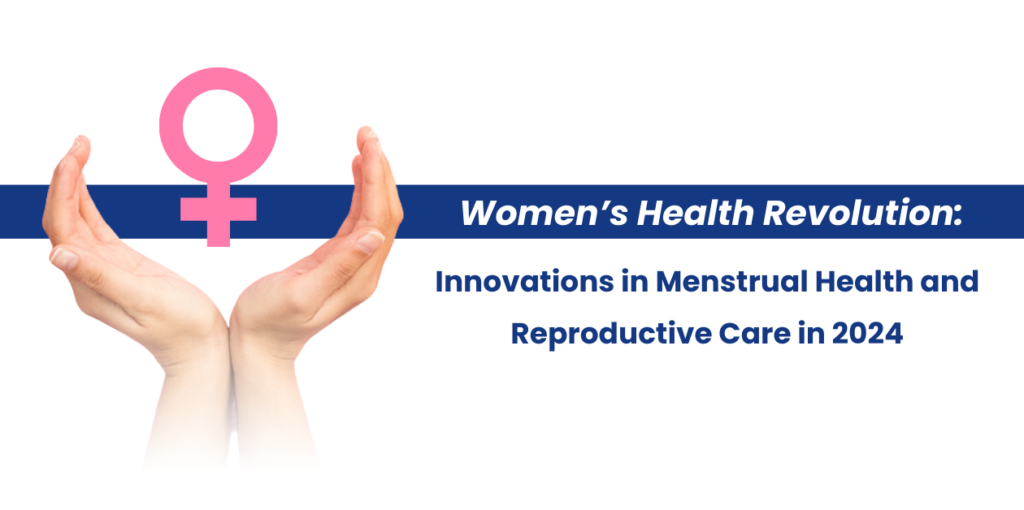Women’s Health Revolution: Innovations in Menstrual Health and Reproductive Care in 2024

Women’s health has seen significant advancements in recent years, particularly in menstrual health and reproductive care. In 2024, new innovations are transforming the way women manage their health. This blog explores the latest treatments for PCOS, endometriosis, and contraceptive technologies, highlighting how these advancements are revolutionizing women’s health.
Innovations in Menstrual Health
Menstrual health is a critical aspect of women’s overall well-being. In 2024, new products and technologies are making menstrual management more convenient and comfortable. Menstrual cups, reusable pads, and period underwear are gaining popularity for their sustainability and effectiveness. Additionally, digital health apps are helping women track their menstrual cycles and manage symptoms more effectively.
Menstrual Cups and Reusable Pads
Menstrual cups and reusable pads offer an eco-friendly alternative to traditional disposable products. Made from medical-grade silicone, menstrual cups can be worn for up to 12 hours, providing a cost-effective and sustainable option. Reusable pads, made from absorbent fabrics, can be washed and reused, reducing waste and environmental impact. These products are becoming more accessible and widely accepted, empowering women to make sustainable choices.
Period Underwear
Period underwear is designed to absorb menstrual flow, providing a comfortable and discreet option for menstrual management. These garments are made from moisture-wicking and antimicrobial fabrics, ensuring comfort and hygiene. Period underwear can be worn alone or as a backup to other menstrual products, offering flexibility and convenience.
Digital Health Apps
Digital health apps are revolutionizing menstrual health by providing personalized insights and tracking capabilities. These apps allow women to log their menstrual cycles, track symptoms, and receive reminders for medication or appointments. Some apps also offer educational resources and support communities, helping women better understand and manage their menstrual health.
PCOS and Endometriosis Treatments
Polycystic Ovary Syndrome (PCOS) and endometriosis are common conditions that affect many women. In 2024, new treatments are offering hope for better management of these conditions,\.
Advancements in PCOS Treatment
PCOS is a hormonal disorder that can cause irregular periods, weight gain, and infertility. In 2024, advancements in hormonal therapies and lifestyle interventions are showing promising results. Medications such as metformin and hormonal contraceptives are commonly used to regulate menstrual cycles and manage symptoms. Additionally, lifestyle changes, including a balanced diet and regular exercise, can help improve insulin sensitivity and reduce symptoms.
Innovative Therapies for Endometriosis
Endometriosis is a condition where tissue similar to the lining of the uterus grows outside the uterus, causing pain and infertility. In 2024, minimally invasive surgeries and new medications are providing relief from pain and improving fertility outcomes. Laparoscopic surgery, which involves small incisions and a camera to remove endometrial tissue, is becoming more precise and effective. Hormonal treatments, such as GnRH agonists and progestins, are also helping to manage symptoms and reduce the recurrence of endometriosis.
Contraceptive Technologies
Contraceptive options have expanded significantly, offering women more choices and control over their reproductive health. In 2024, long-acting reversible contraceptives (LARCs) such as intrauterine devices (IUDs) and contraceptive implants are becoming more accessible. Additionally, new non-hormonal contraceptive methods are being developed, providing alternatives for women who cannot use hormonal options.
Long-Acting Reversible Contraceptives (LARCs)
LARCs, including IUDs and contraceptive implants, offer long-term protection against pregnancy with minimal maintenance. IUDs are small devices inserted into the uterus, while implants are placed under the skin of the upper arm. Both methods are highly effective and can last for several years. In 2024, advancements in LARC technology are making these options more comfortable and easier to insert and remove.
Non-Hormonal Contraceptives
For women who prefer non-hormonal options, new contraceptive methods are being developed. One such innovation is the use of copper IUDs, which prevent pregnancy by releasing copper ions that are toxic to sperm. Additionally, research is ongoing to develop non-hormonal gels and barriers that can be used before intercourse to prevent pregnancy. These options provide effective contraception without the side effects associated with hormonal methods.
Conclusion
The innovations in menstrual health and reproductive care in 2024 are empowering women to take control of their health. By staying informed about the latest treatments and technologies, women can make informed decisions and improve their quality of life. The advancements in menstrual products, PCOS and endometriosis treatments, and contraceptive technologies are revolutionizing women’s health, offering more choices and better outcomes. As we continue to prioritize research and development in this field, we can look forward to a future where women’s health is more accessible, personalized, and effective.
About Author
Dr Saveetha Rathod
MBBS ,MD – PGI , MRCOG – UK,Diploma in cosmetic Gynaecology – ICCG
Dr. Saveetha Rathod is a well-known obstetrician and gynecologist in Hyderabad, known for her compassionate care and unwavering dedication to women’s health. She is deeply committed to continuous learning and growth, ensuring that each patient receives personalized and comprehensive support. Dr. Rathod’s collaborative approach and steadfast advocacy make her a trusted partner in every woman’s journey towards optimal well-being, regardless of age or background.

